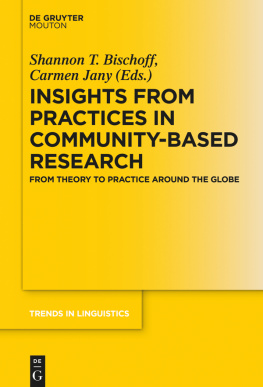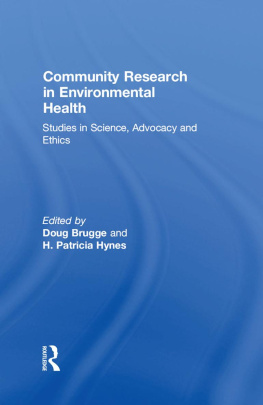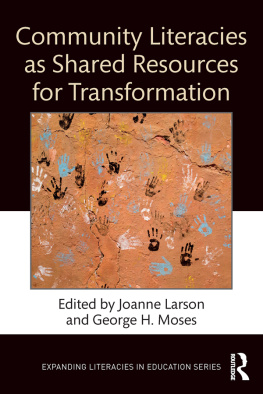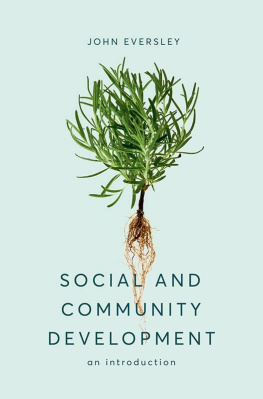Collaborative Research and Social Change
Applied Anthropology in Action
About the Book Editors
Community case studies are basic to anthropology, yet there are relatively few examples in which the promotion of social change has been the explicit goal of the research. The case studies included here are all "natural experiments" that involve long-term community-based research, close collaboration between researchers and representatives of the host community, and the application of research methods and findings to social-change goals within the community. The cases are also unusual because they report on long-term projects that span several yearsin some cases, decades.
Donald D. Stull is associate professor of anthropology and research associate in the Institute for Public Policy and Business Research at the University of Kansas. Jean J. Schensul is executive director of the Community Council of the Capitol Region, Hartford, Connecticut, and associate professor of anthropology at the University of Connecticut.
Collaborative Research and Social Change
Applied Anthropology in Action
edited by
Donald D. Stull and Jean J. Schensul
First published 1987 by Westview Press, Inc.
Published 2018 by Routledge
52 Vanderbilt Avenue, New York, NY 10017
2 Park Square, Milton Park, Abingdon, Oxon OX14 4RN
Routledge is an imprint of the Taylor & Francis Group, an informa business
Copyright 1987 Taylor & Francis
All rights reserved. No part of this book may be reprinted or reproduced or utilised in any form or by any electronic, mechanical, or other means, now known or hereafter invented, including photocopying and recording, or in any information storage or retrieval system, without permission in writing from the publishers.
Notice:
Product or corporate names may be trademarks or registered trademarks, and are used only for identification and explanation without intent to infringe.
Library of Congress Cataloging-in-Publication Data
Collaborative research and social change.
(Westview special studies in applied anthropology)
Includes index.
1. Applied anthropology. 2. Social change. I. Stuff,
Donald D. II. Schensul, Jean J. III. Series.
GN27.C646 1987 303.4 86-10973
ISBN 13: 978-0-367-01071-3 (hbk)
The normal role of human beings in and with the world is not a passive one. Because they are not limited to the natural (biological) sphere but participate in the creative dimension as well, men can intervene in reality in order to change it. Inheriting acquired experience, creating and recreating, integrating themselves into their context, responding to its challenges, objectifying themselves, discerning, transcending, men enter into the domain which is theirs exclusively--that of History and of Culture.
Paulo Freire
Education for Critical Consciousness, 1973
If we have the knowledge and the skill which makes us capable of applying anthropology, then we cannot divest ourselves of the responsibility that goes with that knowledge.
Margaret Mead
"The Evolving Ethics of Applied Anthropology," 1978
They have, in fact, joined themselves with native or exotic peoples on an assumed common basis of involvement in this troubled world of bright and terrible progress. They have acted, to do what they thought was right, although they know, beyond their declaration of supreme values, that they have helped to bring about or to affect a course of change the end of which they cannot see.
Robert Redfield
"Values in Action: A Comment," 1958
Contents
Jean J. Schensul and Donald D. Stull
Jean J. Schensul, Donna Denelli-Hess, Maria G. Borrero, and Ma Prem Bhavati
Donald D. Stull, Jerry A. Schultz, and Ken Cadue, Sr
W. K. Barger and Ernesto Reza
Lucille J. Watahomigie and Akira Y. Yamamoto
Margaret A. Gibson
Paul L. Doughty
Arthur D. Murphy, Ignacio Cabrera Fernandez, Henry A. Selby, and Ignacio Ruiz Love
Robert A. Hackenberg and Beverly H. Hackenberg
Stephen L. Schensul
As in any long-term collaboration, this book could not have been completed without the efforts of many people. The editors wish to thank the contributors for their insightful discussions of collaborative research and for their patience and encouragement over "the long haul." We also wish to thank the American Anthropological Association for permission to publish Margaret Gibson's chapter.
Gwen Stern was instrumental in the inception of this volume and provided valuable critiques on early drafts of many of the chapters. Bernard A. Hirsch provided much needed editorial advice. We also appreciate the initial enthusiasm and continued patience of Barbara Ellington and Bruce Kellison of Westview Press.
We are especially grateful to the Institute for Public Policy and Business Research of the University of Kansas for providing Don Stull with the time to carry out his editorial responsibilities and the support services necessary to produce the volume. Special recognition is due Jan Beecham for her tireless typing and retyping of the manuscripts and final copy, Judy Schrick for patient coordination of staff efforts on our behalf, and Laura Kriegstrom Poracsky for production of the map and figure.
Donald D. Stull
Jean J. Schensul
Jean J. Schensul and Donald D. Stull
Anthropology began with a commitment to utilize research in the solution of human problems. The work of the Aboriginal Protection Society in London (see Schensul and Schensul 1976) and the Women's Anthropological Society of Washington (Helm 1966) in the 19th century initiated a series of dialogues on the proper role of the social sciences in problem solving and social change. The dialogue still continues as anthropologists work with colleagues in other fields on problems of health, education, development, self-determination, global peace, in fact, all aspects of the human condition.
In our search for solutions to human problems, we have found that definitions of these problems, identification of their causes, and their potential solutions are complex. Indeed, if there is a core element that distinguishes applied social researchers from policy makers and politicians, it is our continual cry for recognition of the complexity of social phenomena. Early on, we concluded that no individual, no single theoretical framework, no single disciplinary or sectoral approach is able to address effectively the serious issues of survival and well-being facing our world.
For this reason, much contemporary social science is carried out collaboratively, that is, investigators act in an interdisciplinary partnership to address common conceptual problems. Sometimes this interdisciplinary partnership is further enhanced by the inclusion of multiple "sectors." For example, nutritional research may include representatives from agriculture, housing, or employment sectors whose perspectives are useful in defining complex research models and providing contexts for the use of the information. Intersectoral research of this type is generally applied research, since the term "sector" usually refers to an institution or network of institutions with the ability to make and carry out policy decisions.







